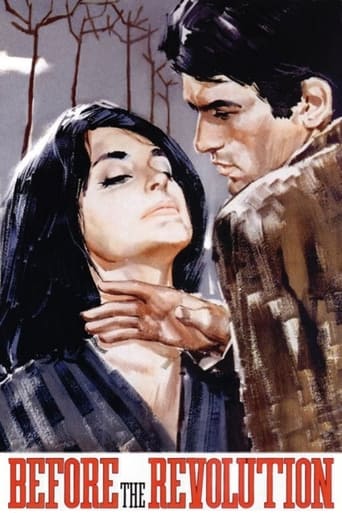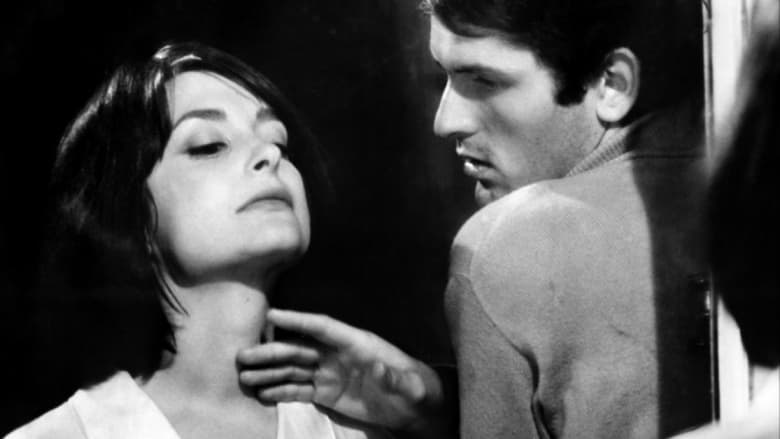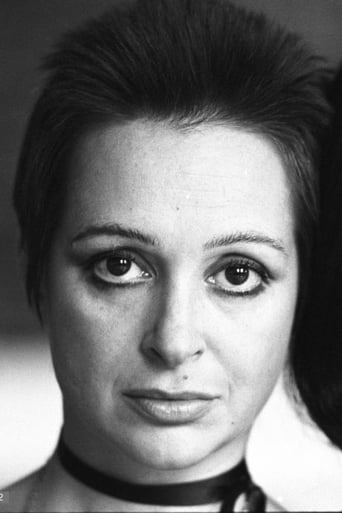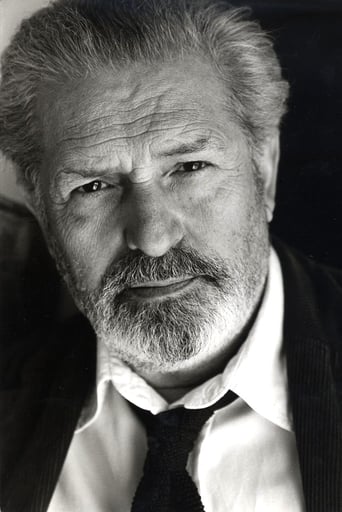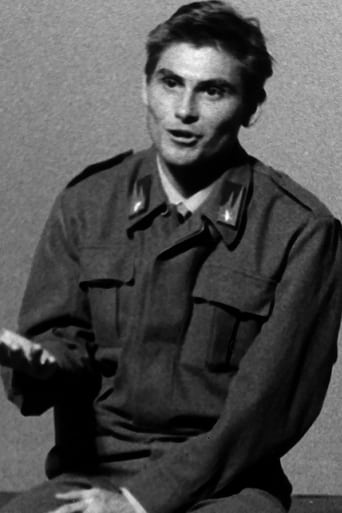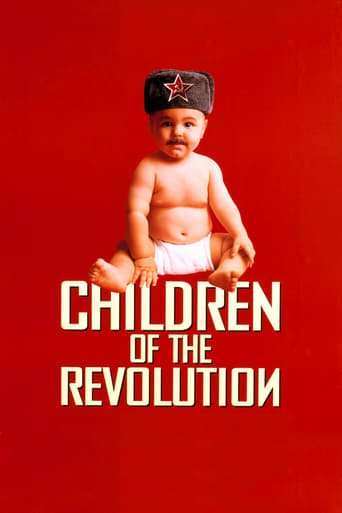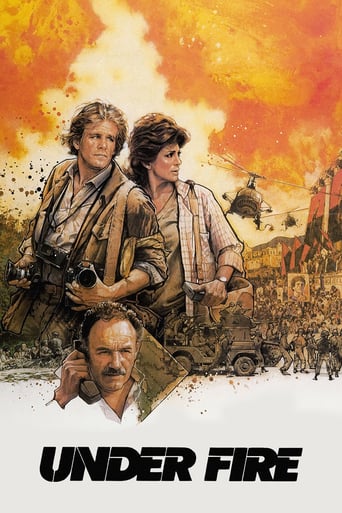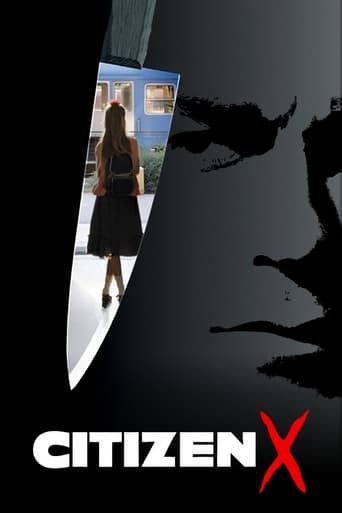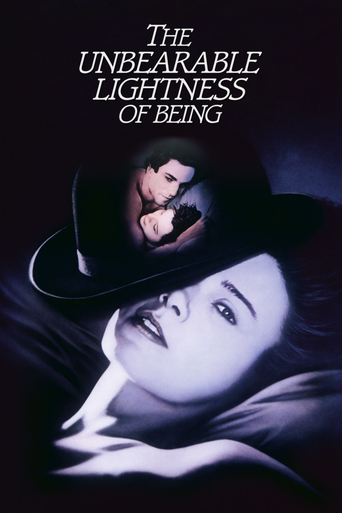Before the Revolution (1964)
The study of a youth on the edge of adulthood and his aunt, ten years older. Fabrizio is passionate, idealistic, influenced by Cesare, a teacher and Marxist, engaged to the lovely but bourgeois Clelia, and stung by the drowning of his mercurial friend Agostino, a possible suicide. Gina is herself a bundle of nervous energy, alternately sweet, seductive, poetic, distracted, and unhinged. They begin a love affair after Agostino's funeral, then Gina confuses Fabrizio by sleeping with a stranger. Their visits to Cesare and then to Puck, one of Gina's older friends, a landowner losing his land, dramatize contrasting images of Italy's future. Their own futures are bleak.
Watch Trailer
Cast


Similar titles
Reviews
While hailed as many as a masterpiece (or near), I struggled with Bertolucci's 2nd film, made when he was only 23, although I am a fan of his in general. Beautifully shot, great use of music and unconventional editing, the film is excellent on a film-making and craft level (although it perhaps borrows too liberally from leading film-makers of the era, especially Godard, Antonioni and Resnais). The story of a young bourgeois man trying to come to terms with his tear between his attraction to communism and his desire for an easier life leads him into an incestuous affair with his somewhat older aunt. I found it's themes somewhat muddled, alternating between being heavy-handedly spelled out, or so obtuse I wasn't sure what a given scene was saying. The acting in particular seems a bit all over the place; understated to the point of flatness in one scene, and then almost theatrically over the top the next. At the end I felt glad I'd seen the film, but it didn't stick with me the way Bertolucci's first film "La Commare Secca" or his third "Partner" did. ("Partner" deals with some of the same themes, but in a far more playful, often comedic way). There was a film-school sort of pretentiousness and emotional distance in "Before the Revolution that kept me from feeling moved or from being led to think deeply about the ideas. That said, I am willing to revisit it and see if my reaction changes, and certainly I enjoyed Bertolucci's already masterful use of image and sound, even if the ends he was using them to were a bit muddled.
Is it immoral for a nephew and aunt to have an affair? ...who cares? - the question is barely raised. This is the Italian New Wave, a cineaste's dream; forget the story, for style is everything.Bertolucci's second film, at age 22, still owes a lot to his mentor Pasolini, but now he has taken on board Godard of "A Woman is a Woman" and Truffaut of "Jules and Jim". It's hopelessly overloaded with style but that makes it fascinating to watch. You never know what the camera is going to do next. A long monologue by Adrianna Asti contains so many zooms, pans, cross-cuts, reverse shots, asymmetrical framing, you name it - it's insane. You stop listening to what she is saying and just wonder what on earth Bertolucci is playing at. Playing at making movies I suppose.It's all fairly aimless but is beautifully shot and the script is quite fine. Asti seems natural as the fragile aunt and Bertolucci makes the most of her - there are moments when she's nudging Audrey Hepburn. There's plenty of gay subtext - a notable feature of many Bertolucci films, for anyone apt to enquire into such things - it certainly assists interpretation.Hardly juvenilia; if you're in the mood, this is a near masterpiece.
The overall plot deals with a young man drawn to his aunt set in Italy prior to its participation in the war.If you watch this film looking at the plot, actor performances, whether it is well directed, etc, you will miss its beauty.You need to relax, sit back and enjoy the juxtaposition of the visual over the music, especially in the last half. It is a wonderful experience. Bertolucci obviously decided not to conform to the intellectualism of Fellini or the structured approach of Zeffirelli.The scene at the theatre, where the young man faces his aunt, set to the background of the opera is almost a dance.Give the left brain a rest and enjoy.
competently made, good acting and interesting editing and camera movement. the film is the standard boy meets girl and loses girl and both are forever unhappy because of their stubbornness. though it's told in that art cinema way where the audience isn't quite sure what has happened in the relationship except that the nature of the relationship has changed. they become cold to each other and are conflicted about whether to stay or leave the relationship. the film feels episodic where scenes don't really fit in, but in each scene, the relationship changes a little. then there's the political part of the film, where the male protagonist questions whether it's possible for a wealthy young man to be part of a communist party. he runs into some people he knows and talk about the revolution and intellectual ideas. it's in these scenes, the film feels decidedly fench. i dunno, i'd probably watch too many french new wave films (more so than Italian ones) where people sit around and talk about revolutions, cinema and communism that i've come to associate these scenes as being french. i wasn't amazed by this film, but i enjoyed it enough and it did not drag on like some art films do. it's worth a look if you're interested in European art cinema of the 60s.

